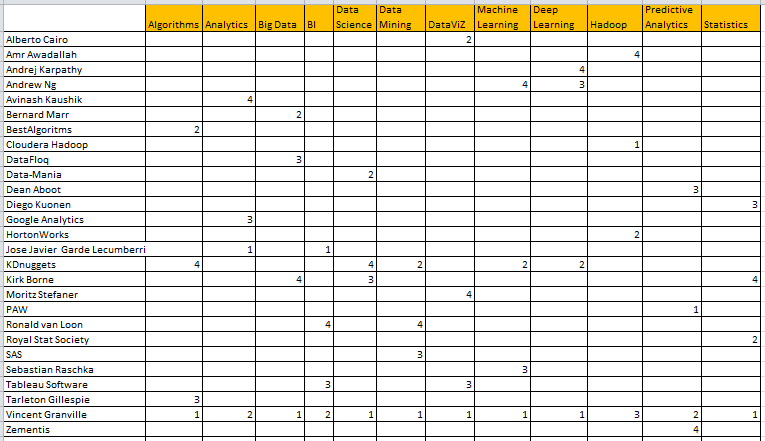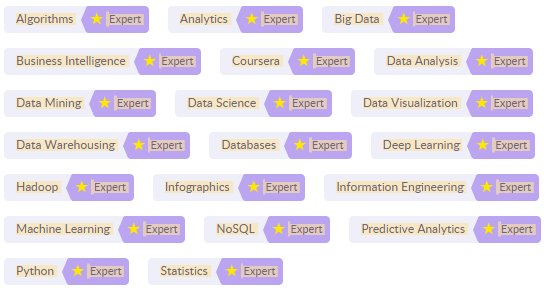According to Klout, the top experts in algorithms are:
- Vincent Granville (71)
- BestAlgorithms (52)
- Tarleton Gillespie (51)
- KDnuggets (71)
- Search Engine Land (75)
- Massachusetts Institute of Technology (MIT) (96)
- Timothy Hopper (59)
- Kirk Borne (72)
The number in parentheses represents the overall Klout score (not just for the algorithm category) for each entry. You can check the list at klout.com/explore/algorithms.
Data Science Central itself (co-founded by Vincent Granville) is listed as having the following expertise:
Click here to check the top experts in each of these categories (you’ll see the same picture, but instead of a picture, it will be clickable links for each category).
Vincent Granville is listed at the top in several of these categories, including:
- Analytics: #2
- Big Data: #1
- Business Intelligence: #2
- Data Visualization: #1
- Deep Learning: #1
- Machine Learning: #1
- NoSQL: #7
- Predictive Analytics: #2
- Hadoop: #3
- Statistics: #1
Below is a table that summarizes much of the most interesting data. For instance, it shows that Bernard Marr is #2 for Big Data.

Finally, algorithms like Klout Scores rely on indexation techniques: these extremely efficient clustering algorithms extract top keywords found in tons of tweets from these people, matching the keywords found with pre-set categories, to cluster these people. While it looks like a big data problem, there is a small data component to it: top, pre-selected keywords are manually selected after extracting millions of keywords found in tweets, sorting them according to frequency, and focusing on the top 1,000 keywords or so. Note that keywords such as “data mining” are identified as one single keyword because the grouping of “data” and “mining” is very popular, while “Hadoop mining” is not.
Such algorithms also rely on linkage analysis (sometimes called collaborative filtering), whereas an un-categorized individual re-tweeting (or better, being re-tweeted for) many tweets from someone strongly categorized as “data mining” gets a higher weight for the “data mining” category and/or is assigned to “data mining”.
Klout rankings are used by journalists when creating lists of top people (typically Twitter accounts) to follow in a specific field.
Relevant articles:
DSC Resources
- Career: Training | Books | Cheat Sheet | Apprenticeship | Certification | Salary Surveys | Jobs
- Knowledge: Research | Competitions | Webinars | Our Book | Members Only | Search DSC
- Buzz: Business News | Announcements | Events | RSS Feeds
- Misc: Top Links | Code Snippets | External Resources | Best Blogs | Subscribe | For Bloggers
Additional Reading
- The 10 Best Books to Read Now on IoT
- 50 Articles about Hadoop and Related Topics
- 10 Modern Statistical Concepts Discovered by Data Scientists
- Top data science keywords on DSC
- 4 easy steps to becoming a data scientist
- 13 New Trends in Big Data and Data Science
- 22 tips for better data science
- Data Science Compared to 16 Analytic Disciplines
- How to detect spurious correlations, and how to find the real ones
- 17 short tutorials all data scientists should read (and practice)
- 10 types of data scientists
- 66 job interview questions for data scientists
- High versus low-level data science
Follow us on Twitter: @DataScienceCtrl | @AnalyticBridge

